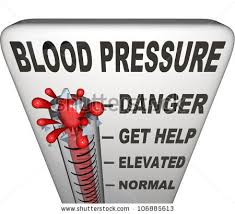HYPERTENSION
 It was found that the causes of high
blood pressure are so much more complex than just eating too much salt. According to sources, only about 5% to 10% of
people with high blood pressure will ever know the exact cause. High blood pressure increases the risk for
getting heart disease and/or kidney disease, and for having a stroke. It is especially dangerous because it often
has no warning signs or symptoms. Regardless
of race, age, or gender, anyone can develop high blood pressure. Once high blood pressure develops, it usually lasts a lifetime.
It was found that the causes of high
blood pressure are so much more complex than just eating too much salt. According to sources, only about 5% to 10% of
people with high blood pressure will ever know the exact cause. High blood pressure increases the risk for
getting heart disease and/or kidney disease, and for having a stroke. It is especially dangerous because it often
has no warning signs or symptoms. Regardless
of race, age, or gender, anyone can develop high blood pressure. Once high blood pressure develops, it usually lasts a lifetime.
 Blood pressure is the force
of your blood against the walls of arteries as the blood passes through. If the pressure is too high, that force can
literally gouge holes in your arteries over time. Blood pressure is recorded as two numbers—the
systolic pressure (as the heart beats) over the diastolic pressure (as the
heart relaxes between beats). The
systolic number is on top and the diastolic number on the bottom. Blood pressure varies -- it tends to be lower
at night during sleep and higher in the morning. Normal blood pressure is less than 120 mmHg
systolic and less than 80 mmHg diastolic.
Blood pressure is the force
of your blood against the walls of arteries as the blood passes through. If the pressure is too high, that force can
literally gouge holes in your arteries over time. Blood pressure is recorded as two numbers—the
systolic pressure (as the heart beats) over the diastolic pressure (as the
heart relaxes between beats). The
systolic number is on top and the diastolic number on the bottom. Blood pressure varies -- it tends to be lower
at night during sleep and higher in the morning. Normal blood pressure is less than 120 mmHg
systolic and less than 80 mmHg diastolic.
 Your heart and arteries have a big
impact on blood pressure. The amount of
blood your heart pumps, how wide or narrow your arteries are, and the volume of
blood in your bloodstream all affects your blood pressure. If your arteries are too narrow, if you have
greater-than-normal blood volume, or if your heart beats more forcefully than
it should, high blood pressure can occur.
Your heart and arteries have a big
impact on blood pressure. The amount of
blood your heart pumps, how wide or narrow your arteries are, and the volume of
blood in your bloodstream all affects your blood pressure. If your arteries are too narrow, if you have
greater-than-normal blood volume, or if your heart beats more forcefully than
it should, high blood pressure can occur.
 The medical term for high blood
pressure is hypertension. High blood pressure is dangerous because it
makes the heart work too hard and contributes to atherosclerosis (hardening of
the arteries). High blood pressure also
can result in other conditions, such as congestive heart failure, kidney
disease, and blindness. A blood pressure
level of 140/90 mmHg or higher is considered high. Prehypertension
is when the blood pressure is between 120/80 mmHg and 139/89 mmHg. High blood pressure is a condition that most
people have at some point in their lives.
The medical term for high blood
pressure is hypertension. High blood pressure is dangerous because it
makes the heart work too hard and contributes to atherosclerosis (hardening of
the arteries). High blood pressure also
can result in other conditions, such as congestive heart failure, kidney
disease, and blindness. A blood pressure
level of 140/90 mmHg or higher is considered high. Prehypertension
is when the blood pressure is between 120/80 mmHg and 139/89 mmHg. High blood pressure is a condition that most
people have at some point in their lives.
Categories for
Blood Pressure Levels in Adults
(Ages 18 Years
and Older)
|
Blood
Pressure Level (mmHg)
|
|
Category
|
Systolic
|
|
Diastolic
|
|
|
<
120
|
and
|
<
80
|
|
|
120-139
|
or
|
80-89
|
|
High
Blood Pressure
|
|
Stage
1 Hypertension
|
140–159
|
or
|
90–99
|
|
Stage
2 Hypertension
|
 160 160
|
or
|
 100 100
|
REFERENCES
1. The Mysteries of High Blood Pressure, Learn what's happening in your body
-- and what you can do to bring your numbers down, By RealAge
2. http://www.nhlbi.nih.gov/hbp/bp/bp.htm

No comments:
Post a Comment